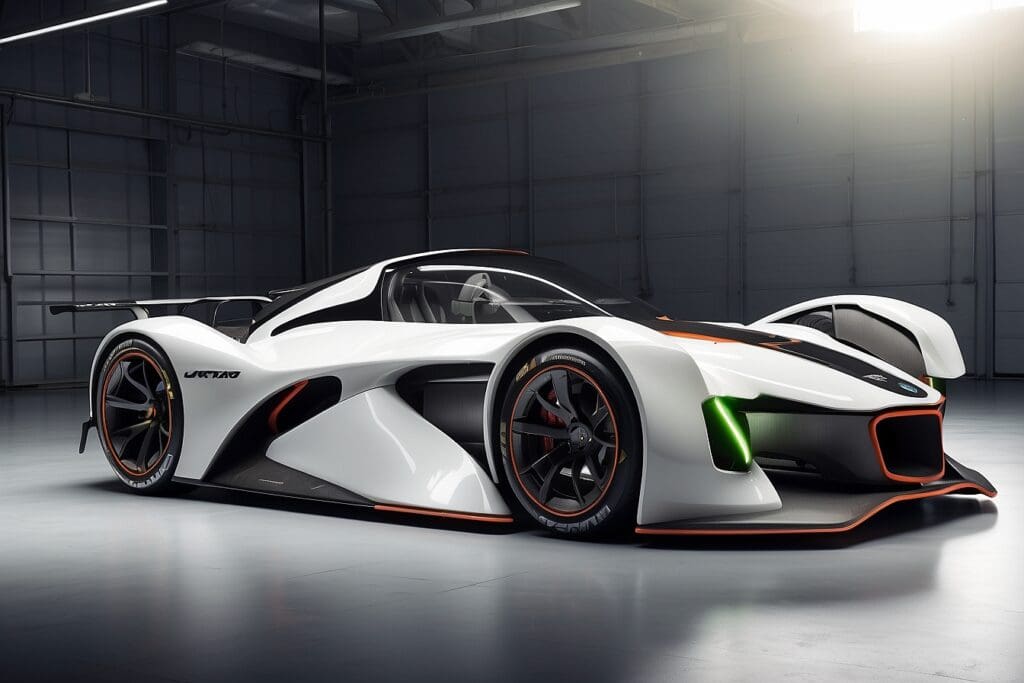As fervent enthusiasts of the racetrack, we’re not just captivated by the exhilarating rush of velocity—it’s impossible to overlook our collective responsibility towards sustainability.
Like you, we hold a deep-seated passion for motorsport while harbouring an unwavering commitment to the health of our planet; did you know that McLaren is on a mission to create an entirely circular car by the year 2030? Our forthcoming article takes a deep dive into how racing cars are gracefully shifting gears towards eco-friendly innovation, with pioneering solutions waiting just around the next corner.
Continue reading and join us as we explore a fascinating realm where velocity embraces vision, crafting a future that’s as fast as it is thoughtful.
Key Takeaways
- Electric and hydrogen – powered vehicles are key in reducing emissions, with McLaren aiming to build a fully circular car by 2030.
- Digital technology is crucial for creating efficient sustainable racing cars, playing a significant role in managing power and enhancing vehicle performance.
- The motorsport industry is embracing renewable energy sources and promoting collaborations that encourage eco-friendly practices, leading towards greener racing events.
- Initiatives supporting the adoption of circular economy principles are influencing automotive manufacturing to use resources efficiently and minimise waste.
- Sustainable motorsports not only contribute to environmental conservation but also drive advancements in vehicle technologies that may influence commercial transportation towards sustainability.
The Shifting Focus to Sustainability in Motorsports

Motorsports are increasingly focusing on sustainability, with the use of electric vehicles and renewable energy sources becoming more prominent. McLaren has set a goal to create a fully circular car by 2030, further pushing the industry towards sustainable technology.
Use of electric vehicles and renewable energy sources
We’re seeing a major shift in the racing industry as it powers towards sustainability. Electric vehicles (EVs) are now speeding around tracks, producing zero emissions and changing our perception of high-octane sport.
These sustainable racing cars draw energy from clean sources like wind and solar power, blazing a trail for renewable energy in racing. They’re not just good for the planet; they show us what’s possible when performance meets eco-friendly technology.
In our quest for greener motorsports, we’re also looking beyond just electric race cars. Innovative solutions involve using eFuels – synthetic fuels made from renewable sources that can power conventional combustion engines with a much lower carbon footprint.
This means even classic petrol-powered machines can join the sustainable revolution without starting from scratch. We embrace these changes eagerly, knowing that each lap on renewable energy brings us closer to a future where every vehicle respects our precious environment.
McLaren’s goal of creating a fully circular car by 2030
McLaren aims to achieve a fully circular car by 2030, incorporating sustainable materials and production processes. The company plans to implement recyclable carbon fiber and other eco-friendly components, reducing environmental impact in the automotive industry.
This initiative aligns with our collective ambition for environmentally friendly racing cars, promoting a circular economy and minimising waste across the automotive sector.
McLaren’s commitment to creating a fully circular car presents an exciting opportunity for advancing green technology in motorsports. By integrating renewable resources and sustainable fuel options into their vehicle design, they are leading the way towards low carbon footprint racing and driving change towards a greener future in motorsports.
Implementation of sustainable technology in commercial vehicles
As we look to the future of sustainable racing cars, the implementation of sustainable technology in commercial vehicles is a crucial step towards reducing emissions and promoting eco-friendly motorsports.
Electric cars and renewable energy sources are increasingly being integrated into the design and operation of commercial vehicles. The use of sustainable vehicle materials, such as those exploring the circular economy in the automotive industry, is further exemplifying a shift towards low carbon racing and clean energy vehicles.
Advancements in electric racing cars are not only driving change towards a greener future but also highlighting the potential for sustainable motorsports. It’s clear that by transitioning to energy-efficient vehicles, we can play an active role in supporting conservation efforts while embracing green technologies within motorsport.
The Importance of Sustainable Motorsports

Sustainable motorsports play a crucial role in reducing emissions and minimising the environmental impact of racing. By promoting green technologies and innovation, it encourages advancements in electric and hydrogen-powered vehicles for a more sustainable future.
Reduction of emissions and environmental impact
Motorsport is crucial in driving the reduction of emissions and environmental impact. Promoting green technologies and innovations, such as eco-friendly racing technologies and zero-emission vehicles, is central to our commitment to sustainability.
Embracing renewable energy sources and the circular economy in the automotive industry will lead to energy-efficient vehicles that are essential for a greener future.
Transitioning towards sustainable motorsport paves the way for advancements in electric and hydrogen-powered vehicles. This not only supports conservation but also aligns with our efforts to minimise the environmental impact, creating a positive legacy for future generations.
Promotion of green technologies and innovation
We support and encourage the use of green technologies and innovation in motorsports. These advancements play a crucial role in driving the shift towards sustainability, promoting eco-friendly racing, and reducing environmental impact.
As we embrace energy-efficient vehicles, such as electric and hydrogen-powered cars, we pave the way for a greener future in motorsports. Collaboration and initiatives that promote sustainable practices are essential for propelling this positive change forward.
By championing green technologies and fostering innovation within the industry, we contribute to a more sustainable future not only for motorsports but also for our planet. This commitment to eco-friendly racing aligns with our dedication to conservation and environmental responsibility.
Advancements in electric and hydrogen-powered vehicles
Advancements in electric and hydrogen-powered vehicles have led to a significant reduction in emissions, making them integral to eco-friendly motorsports. Electric racing cars produce zero tailpipe emissions, contributing to the promotion of green technologies and innovation within the automotive industry.
The development of hydrogen-powered vehicles offers a promising alternative, with their potential for long-range capabilities and rapid refuelling times, providing exciting opportunities for sustainable racing cars.
As we explore advancements in electric and hydrogen-powered vehicles, it’s evident that these technologies are driving positive change towards a greener future. Racing towards sustainability involves embracing these energy-efficient options, paving the way for more environmentally friendly motorsports.
Challenges and Opportunities in Sustainable Motorsports

Ensuring cost reduction and standardisation, leveraging digital technology, and transitioning to renewable energy sources are key challenges and opportunities in sustainable motorsports.
To learn more about the future of eco-friendly racing cars, keep reading!
Cost reduction and standardisation
Motorsports industry leaders are prioritising cost reduction and standardisation to make eco-friendly racing technologies more accessible. This involves streamlining processes, materials, and components across different racing teams to lower production costs and ensure a level playing field.
Standardising certain parts or equipment used in sustainable motorsports can pave the way for economies of scale and increased efficiency, which is crucial for supporting the widespread adoption of green racing technologies.
Innovations like 3D printing and digital technology are driving cost reductions by enabling rapid prototyping, more efficient manufacturing processes, and bespoke part production. These advancements not only cut down on material wastage but also contribute to creating lighter, stronger, and more energy-efficient vehicles.
Digital technology playing an increasingly important role
Digital technology plays an increasingly crucial role in ecofriendly motorsports as it enables the development of more efficient and sustainable racing cars. Advanced simulations and data analytics help engineers design vehicles with better aerodynamics, reduced weight, and improved energy usage, contributing to zero emissions motorsports.
Additionally, real-time monitoring systems enable teams to optimise vehicle performance during races, leading to the advancement of energy-efficient vehicles in green motorsport.
Furthermore, digital technology facilitates the integration of renewable energy sources into racing cars by effectively managing power distribution and consumption. This paves the way for a circular economy in the automotive industry by reducing waste and promoting sustainable practices.
Transition to renewable energy sources
– Transition to renewable energy sources
We are witnessing a major shift in motorsports towards embracing renewable energy sources. From electric vehicles to hydrogen-powered cars, the transition to sustainable and eco-friendly racing is gaining momentum.
The use of renewable energy not only reduces the carbon footprint but also promotes green technology and innovation within the automotive industry. As more racing events and teams embrace this change, we can look forward to a future where sustainable motorsports play a key role in driving positive environmental impact.
Racing Towards a Greener Future
Collaborations and initiatives promoting sustainability are becoming more prevalent in the racing industry, driving the development of eco-friendly technologies. Motorsports play a crucial role in leading the charge towards a greener future, with sustainable practices and innovations at the forefront.
Collaborations and initiatives promoting sustainability
We have observed that collaborations and initiatives promoting sustainability have gained momentum in the racing industry.
- Racing teams partnering with sustainable technology companies to develop eco-friendly racing components, thereby reducing the environmental impact of motorsports.
- Motorsport organisations collaborating with renewable energy providers to power racing events with clean energy sources, contributing to a greener footprint.
- Initiatives encouraging the adoption of circular economy principles in automotive manufacturing, aiming for efficient use of resources and minimising waste.
- Collaborations between motorsport governing bodies and research institutions to advance the development of energy-efficient vehicles, fostering innovation in sustainable racing technologies.
- Partnerships between race organisers and environmental conservation groups for carbon offset programmes, demonstrating a commitment to mitigating emissions from racing activities.
The role of motorsports in driving change towards a greener future
Motorsports plays a vital role in driving change towards a greener future. It serves as a platform for testing and showcasing sustainable technologies, inspiring the development of eco-friendly racing cars and promoting energy-efficient vehicles.
Through collaborations and initiatives that support sustainability, motorsports contribute to raising awareness about environmental conservation and the need for eco-friendly practices within the automotive industry.
The influence of motorsports on driving change towards a greener future is significant. It encourages innovation, drives advancements in green technologies, and paves the way for the adoption of sustainable practices in commercial vehicles.
By embracing this shift towards sustainability, motorsports are actively shaping the future of racing cars that are environmentally friendly while maintaining high-performance standards.
The potential for sustainable motorsports in the future
Sustainable motorsports have the potential to shape a greener future for racing. Eco-friendly initiatives are driving significant advancements in energy-efficient vehicles, promoting the use of sustainable technologies and pushing for more eco-conscious practices within the industry.
As environmentally conscious individuals continue to support conservation efforts, there is an increasing demand for sustainable racing cars that not only reduce emissions but also drive innovation towards a circular economy in the automotive industry.
Furthermore, collaborations and initiatives aimed at promoting sustainability are paving the way for change. Motorsports will play a crucial role in influencing the transition to renewable energy sources and shaping a greener future where eco-friendly racing becomes the norm rather than an exception.
Conclusion
In conclusion, sustainable racing cars are paving the way for a greener future in motorsports. The shift towards eco-friendly technology is evident through the use of electric and hydrogen-powered vehicles.
Collaboration and initiatives promoting sustainability are driving change in the industry. Sustainable motorsports hold immense potential for innovation and environmental conservation in the future.
FAQs
1. What makes racing cars sustainable?
Sustainable racing cars are designed using sustainability technology that focuses on energy efficiency and reduces environmental impact.
2. How will the future of racing cars embrace the circular economy?
The automotive industry is starting to use materials that can be recycled and reused, helping to create a circular economy in making eco-friendly racing vehicles.
3. Are sustainable race cars just as fast as regular ones?
Yes, engineers are working hard to make sure sustainable race cars are not only eco-friendly but also compete with the speed of traditional race cars.
4. Will all future races feature sustainable vehicles?
There’s a strong push toward sustainability in sports, so it’s likely we’ll see more energy-efficient, eco-friendly racing cars dominating future races.





